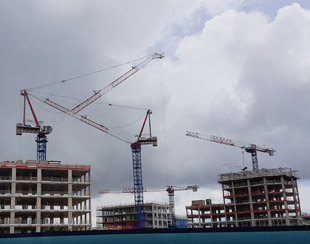COVID-19 has been wreaking havoc across the UK, impacting every industry – including the construction sector. Both in lockdown and beyond the construction industry has faced unprecedented hurdles; financial concerns employee well-being and more. This pandemic has led us into a period of uncertainty, enveloped by challenges which few of us could have anticipated. One completely unexpected tribulation? Crane climbers.
Unfortunately, as the pandemic has left an increasing number of people unemployed while creating widespread financial concerns, acts of criminality like crane climbing have become more frequent. Looking for a quick fix of adrenaline, and possibly an opportunity to steal valuable equipment, these individuals are engaging in damaging behaviour which threatens projects and profits. Meanwhile, crane climbers pose a risk to not only themselves, but the public and your employees.
Preventing crane climbers from accessing your site is vital if you hope to avoid substantial losses should they injure themselves on site; law suits can cost companies millions, often irreparably damaging reputations. How can this be achieved? It’s quite simple; more stringent security measures.
My name is Kai Stok and as the founder of Stok K9 Security Services I have experience in securing construction sites across the UK, effectively deterring crane climbers. If you would like to better protect your site, consider my top tips below:
1.Carefully evaluate your use of CCTV
CCTV might seem like an obvious place to start, but this is for good reason. CCTV allows you to capture crane climbers’ actions on camera, creating invaluable footage records should you need them in the future. However, it’s important that you evaluate your current CCTV systems; do you have blind spots? Are your current CCTV cameras connected to a team of security personnel? These are vital considerations.
I would recommend that you use Passive Infrared Sensors (PIRs). These are relatively inexpensive alarm systems that can be placed around your on-site assets, being triggered when motion is detected. When paired with CCTV, the cameras can then zoom in and realign to give you the best possible angles.
I would also like to emphasise the importance of your cameras being connected to a team of security personnel. Having cameras in place is great, but if no one’s watching the live streams to address criminality when it occurs then they can often prove to be somewhat futile. Your security strategy must allow you to be proactive.
2.Have guards present on site
CCTV is a brilliant basis for any security strategy but it can certainly be built upon. More responsive solutions, for example manned guarding, promise to complement CCTV’s uses. Whilst crane climbers might try their luck at bypassing your CCTV system, they are more likely to be deterred by the presence of security guards on site. These trained individuals bring an invaluable sense of authority.
If you invest in manned guarding then it’s important to consider whether they’re uniformed or not. People typically respond to uniformed guards, for their responsibilities and powers are inherently made clearer. It’s also vital that your guards are stringently assessed and screened; I would advise that all guards are screened in accordance with BS 7858 (the British Standard for security screening of individuals employed in security).
3.Embrace the benefits of dog security
Most people assume that the advantages of dog security have been long outshone by the tech-savvy developments of CCTV … this isn’t the case. CCTV, as aforementioned, is a great starting point. However, for your security to be well-rounded, and ultimately effective, then you need to go above and beyond. Dog security provides a powerful solution which has proven to successfully protect sites across the UK; the intelligence of these dogs cannot be underestimated, their unique skill-sets make them incomparable to CCTV alone.
If you’re apprehensive about dog security then do some research – that will speak for itself. Of course, you need to be careful when choosing your dog handling service, ensuring that they’re trained in accordance with British Standards 8517-2, but the end result will be unquestionably positive. These dogs are taught to sense risks where humans and technology simply can’t, making them the perfect addition to your security strategy.
Overall, I would say that the best security strategies are comprehensive, incorporating a range of security measures which address possible risks from every angle. If possible, embrace all of these techniques to prevent crane climbers from accessing your site; live-feed CCTV, manned guards and dog security.
Visit www.stokk9services.com.










